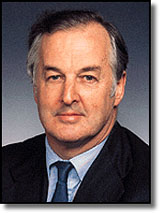
|
BBC Investing in Digital ServicesThe BBC says it intends to spend 9% of its income on new digital services over the next nine years.The money is being found from efficiency savings of 20% over five years. The BBC chairman, Sir Christopher Bland, insists that the investment is well worthwhile. "It is clear that the long-term future of television is digital," he told BBC Radio 4's Today programme.
The BBC would still be able increase spending on its existing networks by about £500 million over the next five years, he said. Sir Christopher was speaking ahead of publication of the BBC's annual report and accounts in Parliament. There has been controversy already over the leaked news that the Director General, John Birt, received an 18% pay rise, to take his annual salary and bonus to £354,000. The chief executives of the two new Production and Broadcast divisions, which cover radio and television, had rises of 40% and 27%. The news upset many BBC staff, whose unions have just settled for a 2.8% pay rise. The efficiency savings are expected to mean more job cuts. Sir Christopher has said that the BBC's remuneration committee had made detailed comparisons with other organisations, in the media and outside, and the new salary packages had not been agreed lightly. The BBC is one year into its 10-year plan to introduce digital television services, with free-to-air channels including BBC1 and BBC2 in widescreen format, and 24-hour news to be launched this autumn. This Politics97 website is one of the fruits of the digital investment.
|
Diana, Princess of Wales, 1961-1997
Conference 97
Devolution
The Archive
News |
Issues |
Background |
Parties |
Analysis |
TV/Radio/Web
Interactive |
Forum |
Live |
About This Site
News |
Issues |
Background |
Parties |
Analysis |
TV/Radio/Web
Interactive |
Forum |
Live |
About This Site
© BBC 1997 |
politics97@bbc.co.uk |

